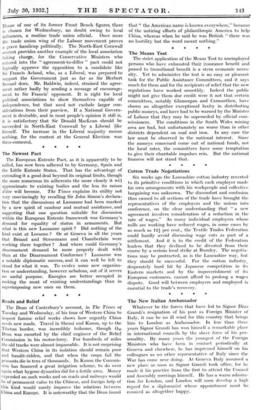Cotton Trade Negotiations Six weeks ago the Lancashire cotton industry
reverted to its primitive conditions in which each employer made his own arrangements with his workpeople and collective bargaining was unknown. The discomfort and confusion thus caused to all sections of the trade have brought the representatives of the employers and the unions into conference, on the clear understanding that " a new agreement involves consideration of a reduction in the rate of wages." As many individual employers whose mills are working have reduced wages, in some cases by as much as 12f per cent., the Textile Trades Federation could hardly avoid discussing wage cuts as part of a settlement. And it is to the credit of the Federation leaders that they declined to be diverted from their course by a serious local strike at Burnley. The negotia- tions may be protracted, as is the Lancashire way, but they should be successful. For the cotton industry, desperately hard hit by Japanese competition in its Eastern markets and by the impoverishment of its European customers, cannot afford to prolong a wages dispute. Good will between employers and employed is essential to the trade's recovery.
*






























 Previous page
Previous page